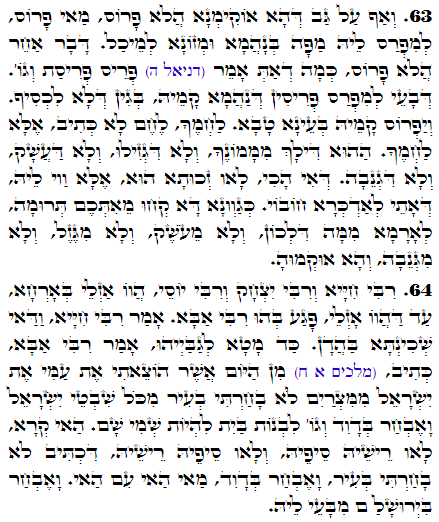Daily Zohar # 2681 – Vayakhel – Spread your bread
Daily Zohar 2681
Daily Zohar 2681

.
Hebrew translation:
64. רַבִּי חִיָּיא וְרַבִּי יִצְחָק וְרַבִּי יוֹסֵי הָיוּ הוֹלְכִים בַּדֶּרֶךְ. עַד שֶׁהָיוּ הוֹלְכִים, פָּגַשׁ בָּהֶם רַבִּי אַבָּא. אָמַר רַבִּי חִיָּיא, וַדַּאי שְׁכִינָה עִמָּנוּ. כְּשֶׁהִגִּיעַ אֲלֵיהֶם, אָמַר רַבִּי אַבָּא, כָּתוּב (מלכים-א ב) מִן הַיּוֹם אֲשֶׁר הוֹצֵאתִי אֶת עַמִּי אֶת יִשְׂרָאֵל מִמִּצְרַיִם לֹא בָחַרְתִּי בְעִיר מִכֹּל שִׁבְטֵי יִשְׂרָאֵל וָאֶבְחַר בְּדָוִד וְגוֹ’ לִבְנוֹת בַּיִת לִהְיוֹת שְׁמִי שָׁם. פָּסוּק זֶה אֵין רֹאשׁוֹ סוֹפוֹ, וְאֵין סוֹפוֹ רֹאשׁוֹ. שֶׁכָּתוּב לֹא בָחַרְתִּי בְעִיר, וָאֶבְחַר בְּדָוִד. מַה זֶּה עִם זֶה? וָאֶבְחַר בִּירוּשָׁלַיִם הָיָה צָרִיךְ לִהְיוֹת!
.
Zohar Vayakhel
#63
When we give, we should do it properly. The verse above tells us ‘divide your bread’. The word ‘divide’ in Hebrew ‘פרוס’ also means ‘spread’. The Torah uses this word to emphasis that we should do it with honoring the receiver so he won’t feel shy or somewhat uncomfortable. The receiver as we learn is our gift from God and we should treat him as such.
We spread a table cloth, bread and food to eat. We cut the bread generously and serve it. The use of ‘Your bread’ in the verse means that the giving should be from the what the person legally earned and own. It should not be something that was stolen or acquired illegally.
If one gives something that was received from ‘non-kosher’ source he is risking being judge twice for the same act. Once when he took the ‘energy’ illegally and again when he gives it. It is so because the action of giving is evaluated for merits and when the source is discovered as not pure another aspect of judgment happens.
It we are asked to give on behalf of another person then we should not forget to mention the source. If we don’t then it is considered as if we ‘stole’ the ‘mitzvah’ and instead of earning merits, we are judged for it. When we mention the source with their names when giving we become messengers of Mitzvah and earn a lot of merits for that.
** Paragraph #64 starts a new discussion and its study moved to the next DZ to connect with the following paragraphs
{||}

 Previous: Vayakhel
Previous: Vayakhel
